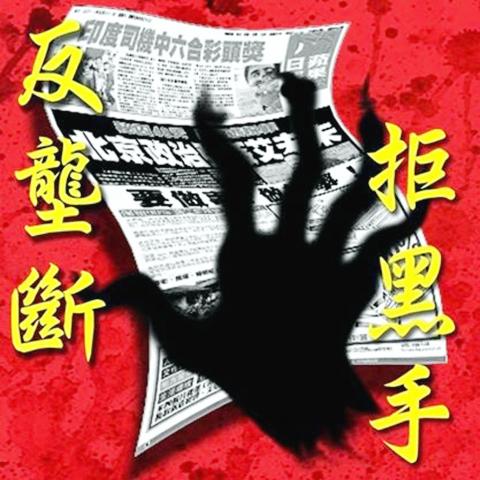Nearly 60 percent of Taiwanese support a full government ban on 4G telecommunication service operators using base stations made by Chinese manufacturers over concerns about national security, a survey by the Digital Convergence Development Association showed yesterday.
The survey also found that about 70 percent of respondents are concerned about national security risks from 4G operators using Chinese telecom facilities, and 69 percent are worried that Beijing could obtain information on Taiwan’s telecom infrastructure through Taiwanese businesspeople in China, or other methods.
Overall, the survey showed that about 58 percent of those polled have no confidence in the government’s ability to fend off cyberattacks from China or other countries.

Image taken from the Youth Alliance Against Media Monsters’ Facebook page
The figure was 7.1 percentage points higher than that recorded in the survey that the association conducted in December last year.
The public’s attitude toward local telecom operators using China-made 4G facilities was about the same as the last survey, with the difference being less than 2 percentage points.
The issue of whether telecom carriers should be allowed to use telecom facilities made in China came to the public’s attention earlier this year after Hon Hai Group (鴻海集團) chairman Terry Gou (郭台銘) threatened to withdraw the group’s investment in Taiwan, stop paying taxes and move overseas if the Taiwanese government failed to provide a reasonable explanation why he could not use base stations produced by Chinese company Huawei Technologies (華為).
The survey was also designed to identify if there had been any shift in attitude toward cable television, telecom services and the media in general.
Among the poll’s significant findings, about 74 percent of respondents said that public opinion in Taiwan was monopolized by certain media groups, up 13.3 points from the previous survey.
While 45 percent said they oppose any form of government funding in television, 44.5 percent said they support government funding to raise programming quality.
Commenting on the findings, Weber Lai (賴祥蔚), a professor at National Taiwan University of the Arts’ radio and television department, said he was horrified at the dramatic increase in the way people perceive the monopolization of public opinion in Taiwan.
The result “is a bit different from what I have observed,” Lai said.
“I suggest that the survey next time ask respondents who they think is monopolizing public opinion. It may be that they mean an oligopoly, not a monopoly,” Lai said.
Christy Chiang (江雅綺), an assistant professor at National Taipei University of Technology, said that the survey showed that more people support restricted government funding to improve the quality of programming, which is very different from 10 years ago.
While 4G operators are seeking more freedom in choosing whatever facilities they see fit, they are simultaneously restricted by public concern for information security, she said.
“Instead of worrying that the government will monopolize public opinion, they now care more that the same thing could be done through any private group,” she said.

MAKING WAVES: China’s maritime militia could become a nontraditional threat in war, clogging up shipping lanes to prevent US or Japanese intervention, a report said About 1,900 Chinese ships flying flags of convenience and fishing vessels that participated in China’s military exercises around Taiwan last month and in January last year have been listed for monitoring, Coast Guard Administration (CGA) Deputy Director-General Hsieh Ching-chin (謝慶欽) said yesterday. Following amendments to the Commercial Port Act (商港法) and the Law of Ships (船舶法) last month, the CGA can designate possible berthing areas or deny ports of call for vessels suspected of loitering around areas where undersea cables can be accessed, Oceans Affairs Council Minister Kuan Bi-ling (管碧玲) said. The list of suspected ships, originally 300, had risen to about

DAREDEVIL: Honnold said it had always been a dream of his to climb Taipei 101, while a Netflix producer said the skyscraper was ‘a real icon of this country’ US climber Alex Honnold yesterday took on Taiwan’s tallest building, becoming the first person to scale Taipei 101 without a rope, harness or safety net. Hundreds of spectators gathered at the base of the 101-story skyscraper to watch Honnold, 40, embark on his daredevil feat, which was also broadcast live on Netflix. Dressed in a red T-shirt and yellow custom-made climbing shoes, Honnold swiftly moved up the southeast face of the glass and steel building. At one point, he stepped onto a platform midway up to wave down at fans and onlookers who were taking photos. People watching from inside

Japan’s strategic alliance with the US would collapse if Tokyo were to turn away from a conflict in Taiwan, Japanese Prime Minister Sanae Takaichi said yesterday, but distanced herself from previous comments that suggested a possible military response in such an event. Takaichi expressed her latest views on a nationally broadcast TV program late on Monday, where an opposition party leader criticized her for igniting tensions with China with the earlier remarks. Ties between Japan and China have sunk to the worst level in years after Takaichi said in November that a hypothetical Chinese attack on Taiwan could bring about a Japanese

The WHO ignored early COVID-19 warnings from Taiwan, US Deputy Secretary of Health and Human Services Jim O’Neill said on Friday, as part of justification for Washington withdrawing from the global health body. US Secretary of State Marco Rubio on Thursday said that the US was pulling out of the UN agency, as it failed to fulfill its responsibilities during the COVID-19 pandemic. The WHO “ignored early COVID warnings from Taiwan in 2019 by pretending Taiwan did not exist, O’Neill wrote on X on Friday, Taiwan time. “It ignored rigorous science and promoted lockdowns.” The US will “continue international coordination on infectious